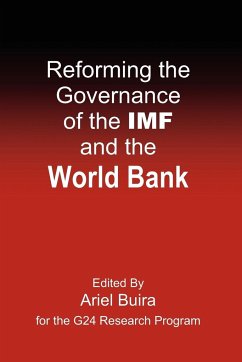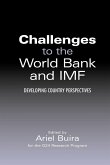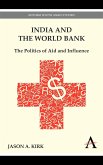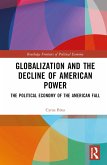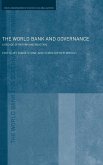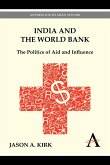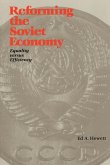Reforming the Governance of the IMF and the World Bank
Herausgeber: Buira, Ariel
Reforming the Governance of the IMF and the World Bank
Herausgeber: Buira, Ariel
- Broschiertes Buch
- Merkliste
- Auf die Merkliste
- Bewerten Bewerten
- Teilen
- Produkt teilen
- Produkterinnerung
- Produkterinnerung
A radical and comprehensive review of the practices of governance within one of the world's most important and influential organizations.
Andere Kunden interessierten sich auch für
![Challenges to the World Bank and IMF Challenges to the World Bank and IMF]() Challenges to the World Bank and IMF34,99 €
Challenges to the World Bank and IMF34,99 €![India and the World Bank India and the World Bank]() Jason A. KirkIndia and the World Bank104,99 €
Jason A. KirkIndia and the World Bank104,99 €![Globalization and the Decline of American Power Globalization and the Decline of American Power]() Cyrus BinaGlobalization and the Decline of American Power149,99 €
Cyrus BinaGlobalization and the Decline of American Power149,99 €![The World Bank and Governance The World Bank and Governance]() Christopher Wright (ed.)The World Bank and Governance113,99 €
Christopher Wright (ed.)The World Bank and Governance113,99 €![Joseph Stiglitz and the World Bank Joseph Stiglitz and the World Bank]() Joseph Stiglitz and the World Bank35,99 €
Joseph Stiglitz and the World Bank35,99 €![India and the World Bank India and the World Bank]() Jason A. KirkIndia and the World Bank44,99 €
Jason A. KirkIndia and the World Bank44,99 €![Reforming the Soviet Economy Reforming the Soviet Economy]() Ed A. HewettReforming the Soviet Economy31,99 €
Ed A. HewettReforming the Soviet Economy31,99 €-
-
-
A radical and comprehensive review of the practices of governance within one of the world's most important and influential organizations.
Produktdetails
- Produktdetails
- Verlag: Anthem Press
- Seitenzahl: 328
- Erscheinungstermin: 5. September 2000
- Englisch
- Abmessung: 234mm x 156mm x 18mm
- Gewicht: 500g
- ISBN-13: 9781843312116
- ISBN-10: 1843312115
- Artikelnr.: 21028589
- Herstellerkennzeichnung
- Libri GmbH
- Europaallee 1
- 36244 Bad Hersfeld
- gpsr@libri.de
- Verlag: Anthem Press
- Seitenzahl: 328
- Erscheinungstermin: 5. September 2000
- Englisch
- Abmessung: 234mm x 156mm x 18mm
- Gewicht: 500g
- ISBN-13: 9781843312116
- ISBN-10: 1843312115
- Artikelnr.: 21028589
- Herstellerkennzeichnung
- Libri GmbH
- Europaallee 1
- 36244 Bad Hersfeld
- gpsr@libri.de
Ariel Buira is Director of the G24 Secretariat. He has been Special Envoy of the President of Mexico for the UN Conference on Financing for Development, Ambassador of Mexico, Member of the Board of Governors of the Bank of Mexico and Executive Director of the IMF. His publications include 'The IMF and the World Bank at Sixty' (Anthem Press, 2005) and 'Challenges to the World Bank and IMF: Developing Country Perspectives' (Anthem Press, 2003).
List of Contributors; Foreword; 1. Introduction; 2. The Bretton Woods
Institutions: Governance without Legitimacy?; 3. Reforming the
International Monetary Fund: Towards Enhanced Accountability and
Legitimacy; 4. Improving IMF Governance and Increasing the Influence of
Developing Countries in IMF Decision-Making; 5. Issues on IMF Governance
and Represenation: An Evaluation of Alternative Options; 6. Making the IMF
and the World Bank More Accountable; 7. Purchasing Power Parities and
Comparisons of GDP in IMF Quota Calculations; 8. Measuring Vulnerability:
Capital Flows Volatility in the Quota Formula; 9. Enhancing the Voice of
Developing Countries in The World Bank: Selective Double Majority Voting
and a Pilot Phase Approach; 10. Voting Power Implications of a Double
Majority Voting Procedure in the IMF's Executive Board; 11. Power versus
Weight in IMF Governance: The Possible Beneficial Implications of a United
European Bloc Vote; 12. Changing IMF Quotas: The Role of the United States
Congress
Institutions: Governance without Legitimacy?; 3. Reforming the
International Monetary Fund: Towards Enhanced Accountability and
Legitimacy; 4. Improving IMF Governance and Increasing the Influence of
Developing Countries in IMF Decision-Making; 5. Issues on IMF Governance
and Represenation: An Evaluation of Alternative Options; 6. Making the IMF
and the World Bank More Accountable; 7. Purchasing Power Parities and
Comparisons of GDP in IMF Quota Calculations; 8. Measuring Vulnerability:
Capital Flows Volatility in the Quota Formula; 9. Enhancing the Voice of
Developing Countries in The World Bank: Selective Double Majority Voting
and a Pilot Phase Approach; 10. Voting Power Implications of a Double
Majority Voting Procedure in the IMF's Executive Board; 11. Power versus
Weight in IMF Governance: The Possible Beneficial Implications of a United
European Bloc Vote; 12. Changing IMF Quotas: The Role of the United States
Congress
List of Contributors; Foreword; 1. Introduction; 2. The Bretton Woods
Institutions: Governance without Legitimacy?; 3. Reforming the
International Monetary Fund: Towards Enhanced Accountability and
Legitimacy; 4. Improving IMF Governance and Increasing the Influence of
Developing Countries in IMF Decision-Making; 5. Issues on IMF Governance
and Represenation: An Evaluation of Alternative Options; 6. Making the IMF
and the World Bank More Accountable; 7. Purchasing Power Parities and
Comparisons of GDP in IMF Quota Calculations; 8. Measuring Vulnerability:
Capital Flows Volatility in the Quota Formula; 9. Enhancing the Voice of
Developing Countries in The World Bank: Selective Double Majority Voting
and a Pilot Phase Approach; 10. Voting Power Implications of a Double
Majority Voting Procedure in the IMF's Executive Board; 11. Power versus
Weight in IMF Governance: The Possible Beneficial Implications of a United
European Bloc Vote; 12. Changing IMF Quotas: The Role of the United States
Congress
Institutions: Governance without Legitimacy?; 3. Reforming the
International Monetary Fund: Towards Enhanced Accountability and
Legitimacy; 4. Improving IMF Governance and Increasing the Influence of
Developing Countries in IMF Decision-Making; 5. Issues on IMF Governance
and Represenation: An Evaluation of Alternative Options; 6. Making the IMF
and the World Bank More Accountable; 7. Purchasing Power Parities and
Comparisons of GDP in IMF Quota Calculations; 8. Measuring Vulnerability:
Capital Flows Volatility in the Quota Formula; 9. Enhancing the Voice of
Developing Countries in The World Bank: Selective Double Majority Voting
and a Pilot Phase Approach; 10. Voting Power Implications of a Double
Majority Voting Procedure in the IMF's Executive Board; 11. Power versus
Weight in IMF Governance: The Possible Beneficial Implications of a United
European Bloc Vote; 12. Changing IMF Quotas: The Role of the United States
Congress

